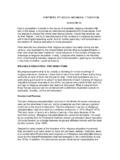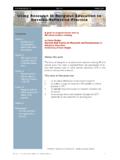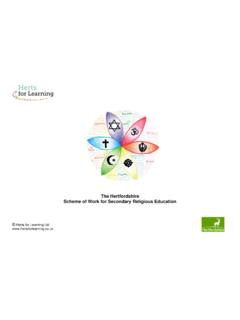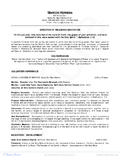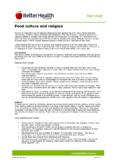Transcription of A Curriculum Framework for Religious Education in England
1 A Curriculum Framework for Religious Education in England The Religious Education Council of England and Wales October 2013. Review of Religious Education in England Member bodies of the RE Council October 2013. Accord Coalition Independent Schools Religious Studies Al-Khoei Foundation Association All Faiths and None Institute of Jainology Association of Christian Teachers (ACT) Inter Faith Network for the United Kingdom Association of RE Inspectors, Advisers and ISKCON Educational Services Consultants (AREIAC) Islamic Academy Association of University Lecturers in Religion Jewish Teachers' Association and Education (UK) Keswick Hall Trust Barnabas in Schools (BRF) The Methodist Church Bloxham Project Muslim Council of Britain Board of Deputies of British Jews National Association of Standing Advisory British Association for the Study of Religions Councils on RE. (BASR) National Association of Teachers of RE. British Humanist Association National Council of Hindu Temples (UK).
2 The Buddhist Society NBRIA National Board of (Catholic) RE. Cambridge Muslim College Inspectors and Advisers Catholic Association of Teachers, National Society (Church of England ) for Schools and Colleges Promoting Religious Education Catholic Education Service National Spiritual Assembly of the Bah ' s of Christian Education / RE Today the United Kingdom Church of England Board of Education Network of Buddhist Organisations (UK). Church in Wales Division for Education Network of Sikh Organisations Church of Jesus Christ of Latter-day Saints The Oxford Foundation Churches Together in England Pagan Federation Clear Vision Trust (Buddhist) REEP: The Religious Education and Council of African and Afro-Caribbean Churches Environment Programme Culham St Gabriel's Religious Education Movement, Wales Deanery of Great Britain and Ireland St Luke's College Foundation The Farmington Institute Shap Working Party FBFE: The National Council of Faiths and Stapleford Centre Beliefs in Further Education Theology and Religious Studies UK (TRS UK).
3 Federation of RE Centres 3FF, Three Faiths Forum Free Church Education Committee Tony Blair Faith Foundation Hindu Council (UK) United Sikhs Hindu Forum of Britain Wales Association of SACREs (WASACRE). Hockerill Educational Foundation World Congress of Faiths Zoroastrian Trust Funds of Europe 2. Review of Religious Education in England Contents Member bodies of the RE Council October 2013 2. FOREWORD 5. INTRODUCTION 6. Religious Education : A NATIONAL Curriculum Framework 9. Appendix: Expectations, progression and achievement in RE 26. Donors 31. 3. Review of Religious Education in England FOREWORD. The place of RE on the basic Curriculum has always been clear and local determination of its Curriculum has been part of the statutory arrangements for RE over many years. I welcome Religious Education : a national Curriculum Framework as a national benchmark document for use by all those responsible for the RE Curriculum locally.
4 I also welcome the wider Review of RE in England of which it is part. The RE Review, an initiative of the Religious Education Council of England and Wales, takes account of wider educational aims, including the aims of the new national Curriculum . In particular, it embodies respect for the law and the principles of freedom, responsibility and fairness. It demonstrates a commitment to raising expectations and standards of the RE received by all children and young people. All children need to acquire core knowledge and understanding of the beliefs and practices of the religions and worldviews which not only shape their history and culture but which guide their own development. The modern world needs young people who are sufficiently confident in their own beliefs and values that they can respect the Religious and cultural differences of others, and contribute to a cohesive and compassionate society. RE's place on the Curriculum will be strong if its role and importance are communicated effectively and widely understood.
5 RE in England compares favourably with equivalent curricula in high performing jurisdictions around the world, but this reputation can only be maintained with a rigorous model of RE. This RE Curriculum Framework and the RE Review of which it is part provides for such a model. It has the endorsement of a very wide range of professional organisations and bodies representing faiths and other worldviews. I hope the document will be useful to all those seeking to provide RE. of the highest quality for young people in our schools. Michael Gove Secretary of State for Education 5. Review of Religious Education in England INTRODUCTION. Every child and young person who goes to school is entitled to an experience of Religious Education (RE) that is both academically challenging and personally inspiring. To that end, the RE. Council of England and Wales (REC) undertook a review of the subject in England (referred to as the Review').
6 It has drawn as widely as possible on the expertise of the RE community to develop a benchmark Curriculum that promotes high quality learning and teaching in all schools in the coming years, and to map out issues for further development. School structures are becoming increasingly diverse in England . It is important that within this diversity, schools' RE curricula give all young people the opportunity to gain an informed understanding of Religious beliefs and The REC began the Review early in 2012, as part of its wider strategic plan2 for developing the subject. This decision was supported by the then Minister of State for Schools, Nick Gibb MP, who described the REC as well placed' to do so in a letter to John Keast, REC Chair, on the 25th January 2012. The REC is uniquely fitted for this task, with its wide membership, the range of views from both faith-based groups and Education professionals and its commitment to an inclusive approach to RE.
7 The main catalyst for the Review was the extensive review of the national Curriculum for schools in England , undertaken by the Department for Education (DfE) from January 2011 to July 2013. RE was not part of the DfE review as it is not one of the national Curriculum subjects. The REC. was clear that a review of RE in England was needed for reasons of equity with other subjects. Large changes to the Curriculum have implications for all subjects3, including RE. From September 2014, teachers with responsibility for RE in schools in England will be expected to plan lessons, assess pupil progress, and have their performance held to account, as other teachers do. School leaders will expect them to use the same or similar criteria to those deployed in other subjects in the Curriculum . For this reason alone, a new RE Curriculum document is needed to support those teachers and schools, laid out in the same style as the documents for the national Curriculum .
8 Beyond the need for parity, a wider set of challenges for RE has arisen in the past three years, mainly as the result of large-scale changes in Education made by the Coalition government. These include the introduction of the English Baccalaureate, towards whose achievement GCSE. Religious Studies cannot be counted, significant reforms of GCSE and A Level qualifications, the extension of the academies programme and introduction of free schools, all of which have implications for the way in which RE and its Curriculum are decided and supported. Local authority cuts have also led to the reduction of local support for RE, and the number of new trainee teachers has been slashed. The total number of GCSE Religious Studies entries has started to decline after many years of growth. 1. The REC recognises that in schools with a Religious character, there is likely to be an aspiration that RE (and other aspects of school life) will contribute to pupils' faith development.
9 2. 3. The RE Curriculum is set locally, not nationally. Broadly speaking, it is set for community and voluntary controlled schools by local agreed syllabus conferences, advised by local SACREs, and by governing bodies in the case of academies, free schools and voluntary aided schools. 6. Review of Religious Education in England The RE community has felt a sense of crisis despite government assurance. This assurance has been challenged by many stakeholders in RE and the threats to RE confirmed in a report of the RE All Party Parliamentary Group (APPG), RE: The Truth Unmasked in 2013. The adverse consequences of government policy on RE's place in schools were recognised subsequently by the Secretary of State for Education on 3rd July 2013. Addressing an event at Lambeth Palace, Michael Gove conceded that RE had been an unintended casualty' of recent Curriculum reforms, and acknowledged that in thinking that RE's special status' was protected he had not done enough'.
10 Furthermore, successive triennial Ofsted reports for RE have argued, and the APPG. inquiry has confirmed, that there are significant and well-founded concerns about the uneven quality of learning and teaching in RE across the country. In this context, a review presented the RE community with an opportunity not only to reflect again on the nature and purpose of the subject and its distinctive contribution to the Curriculum , and to find better ways of articulating these to a general audience, but also to seek ways of raising standards. At its best, RE is an inspirational subject for pupils, as the REC's Young Ambassadors project has No public money has been allocated to support this Review, even though RE is a subject required on the Curriculum of all state funded schools in England . Instead, the Review has been made possible by generous donations from REC members, charitable trusts and other interested organisations.

